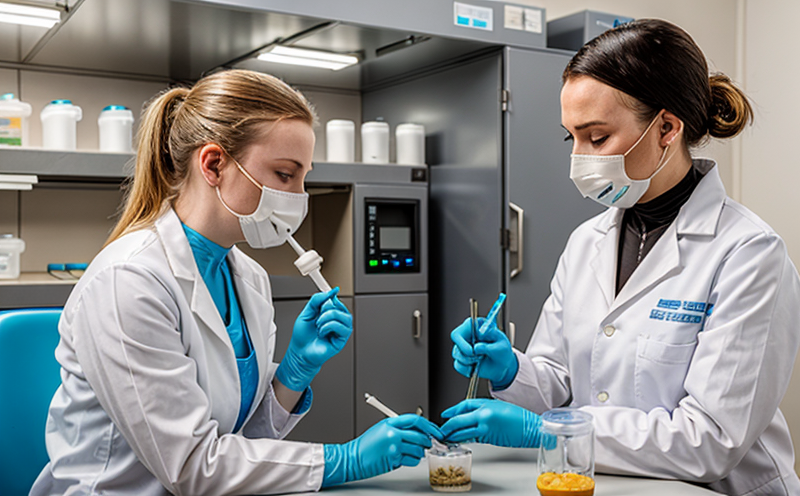ASTM D6303 Multi-Mycotoxin Screening in Food Products
The ASTM D6303 test is a pivotal method used to screen for multiple mycotoxins present in food products. Mycotoxins are toxic metabolites produced by certain molds, particularly in grains, nuts, spices, and other agricultural commodities. Their presence can pose significant health risks, including acute toxicity, carcinogenicity, and immunosuppression, making their detection and quantification crucial.
The ASTM D6303 protocol employs liquid chromatography with tandem mass spectrometry (LC-MS/MS) to identify up to 15 different mycotoxins simultaneously. The test covers a broad range of mycotoxins including aflatoxin B1, fumonisin B1, deoxynivalenol, and zearalenone, among others. This comprehensive approach ensures that food producers can quickly assess the overall mycotoxin profile in their products.
The process begins with sample preparation, which involves extraction of the mycotoxins from the food matrix using a solvent system such as acetonitrile-water. The extracted compounds are then cleaned up and concentrated before being injected into the LC-MS/MS instrument for analysis. The method is sensitive enough to detect trace levels of mycotoxins, down to parts per billion (ppb) in many cases.
The acceptance criteria for ASTM D6303 are based on regulatory limits set by organizations like the FAO and the WHO. Compliance with these standards is critical to ensure food safety. For instance, aflatoxin B1 has an acceptable daily intake (ADI) of 0.5 μg/kg body weight per day as set by WHO/FAO.
The test’s versatility allows for the screening of various food products including cereals, nuts, oils, and spices. This makes it indispensable for quality managers and compliance officers who need to ensure that their products meet international safety standards. In addition, R&D engineers can use this method to investigate the effects of different storage conditions or processing techniques on mycotoxin levels.
The ASTM D6303 test is not only beneficial for food producers but also for procurement departments ensuring they receive safe and compliant raw materials. The rapid turnaround time of LC-MS/MS makes it an efficient tool for batch testing, thereby helping businesses stay ahead in the competitive food market.
Why Choose This Test
Selecting the ASTM D6303 multi-mycotoxin screening test is a strategic decision that offers several advantages. Firstly, it provides a comprehensive overview of mycotoxins present in a single sample, saving time and resources compared to testing for each toxin individually. This holistic approach ensures that no harmful compounds are overlooked.
Secondly, the high sensitivity of LC-MS/MS allows for accurate detection at extremely low levels, which is crucial for maintaining food safety standards globally. Regulatory bodies like FDA and EU member states rely on such rigorous methods to protect public health.
Thirdly, the method’s robustness ensures consistent results across different laboratories, facilitating inter-laboratory comparisons and accreditation. This reliability is particularly important in the context of international trade where harmonization of testing protocols is essential.
Moreover, the ASTM D6303 test supports sustainability initiatives by helping food producers adopt best practices for minimizing mycotoxin contamination. By identifying high-risk batches early, companies can implement corrective actions promptly, reducing waste and maintaining consumer trust.
A final benefit lies in its adaptability to various food matrices. The test protocol is designed to accommodate diverse samples, from simple liquids like oils to complex mixtures such as ground cereals. This flexibility ensures that no matter the product type, the test remains applicable and effective.
Environmental and Sustainability Contributions
The ASTM D6303 multi-mycotoxin screening test contributes significantly to environmental sustainability by promoting safer food production practices. By detecting mycotoxins early in the supply chain, producers can take proactive measures to mitigate contamination risks. This not only ensures product safety but also reduces the need for extensive recalls and waste disposal.
Furthermore, the method supports sustainable agriculture by encouraging farmers and processors to adopt cleaner methods of storage and processing that minimize mold growth. For instance, proper drying techniques or improved packaging can prevent the development of harmful molds before they produce mycotoxins.
The test also plays a role in reducing food waste. By identifying contaminated batches quickly, companies can isolate affected products and reuse them appropriately rather than discarding entire lots. This efficiency improves resource utilization and reduces environmental impact associated with unnecessary disposal.
Additionally, the ASTM D6303 method aids in the development of more sustainable supply chains by fostering collaboration between producers, processors, and regulatory bodies. Through standardized testing practices, all stakeholders can work towards a common goal of ensuring food safety while minimizing ecological footprints.
Use Cases and Application Examples
The ASTM D6303 multi-mycotoxin screening test finds application in various sectors within the food industry. Quality managers use it to monitor incoming raw materials for potential contamination, ensuring that only safe ingredients enter production lines.
In processing plants, this method allows for real-time quality checks at different stages of manufacturing. For example, a processor might use ASTM D6303 to test partially processed grains before they are blended with other components. This ensures consistency in final product quality and safety.
R&D engineers can leverage the test’s capabilities to explore new processing techniques or ingredients that could reduce mycotoxin formation. By continuously monitoring changes, they can refine methods to enhance food safety without compromising taste or texture.
For procurement teams, ASTM D6303 serves as a reliable tool for evaluating third-party suppliers. By comparing test results with established standards, companies can select partners who adhere strictly to quality and safety protocols.
In export markets, compliance with international regulations is paramount. The ASTM D6303 test helps food exporters navigate complex regulatory landscapes by providing robust evidence of product safety. This enhances market access and builds trust among foreign consumers.





